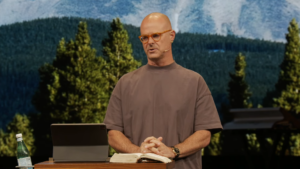Jen Hatmaker, the popular I’m-pretending-to-be-a-Christian-but-I’m-actually-a-pagan mommy-blogger and podcaster revealed on episode 34 of The Bible for Normal People podcast how she became to be pro-LGBTQ, revealing that Jesus’ teaching on the fruit is what finally convinced her. She declares that the fruit of non-affirming households is universally disgusting and teeming with depression, self-hatred and suicidal ideation, whereas the fruit of affirming households is “universally good” and full of life and joy.
Last time we caught up with her, she was celebrating homosexuality, being pro-transgender, becoming a woke racial justice warrior by saying, “the center of the church has failed to be black, gay, and transgender,” and lamenting the death of notorious pro-abort Ruth Bader Ginsberg, giving her the benediction, “Well done, good and faithful servant.”
Now, she talks to Pete Enns about how she came to embrace sodomy. Though she doesn’t mention it, we can’t help but believe that the fact that her daughter Sydney coming out as a lesbian played a major role in justifying her new theological position, if not the overriding factor that she then bent the bible around.
During her conversation, she recounts how painful and difficult it was to come out of the closet with her new beliefs, lamenting that those who were criticizing her didn’t even know her.
And at its core it dismantled what I hold incredibly dear, which is our faithfulness, our commitment to Scripture and to living it out with integrity, our love of the church, our unwavering devotion to Jesus, all those things that have marked our entire lives that we have given our lives over to.
Those were the things on the chopping block. And so to be painted as a heretic with no regard for scripture, who is throwing it all out for the sake of her feelings, and that’s where the misogyny came in – very much the painted as a hysterical woman who feels too much – and to have no honoring of the deeply academic, intellectual, spiritual process that brought us to that point.
I think that’s what hurt the most, I felt mischaracterized and misrepresented, certainly misunderstood. And then all by people who don’t know us, have never had any contact with us in ministry, in church in our work. And just from the comfort of their arm chair, were prepared to burn down 20 years of faithful service.So I think it was a combination for me of just shock, and fury. And then just a basic case of incredibly hurt feelings…
Jenn explains the basis for her beliefs.
I think that a great deal of scriptural discussion on injustice and poverty is serious. I think God meant that. And that was sort of the beginning of that. In terms of, to our original discussion, our approach to the LGBTQ theology, and golly, there’s no end of how many books we read, and how many teachers we listened to, and how many conversations we engaged in.
A sense of investigation just permeated our spiritual lives for probably two or three years, to be honest. But if I had to pick a biblical spot that deeply, deeply affected us on our understanding, obviously, so much of what’s written about homosexuality, if you will in scripture is contextually bound, and there’s not much in there, frankly, but it’s deeply bound to culture, to religious norms, just like 1000 other points in the Bible are as well.
But when we struggled to find clarity, when the Bible just refused to cooperate [Editor’s note: Who was refusing to cooperate? Hint: It wasn’t the Bible.] on perfect clarity, which is what we wanted. That’s what I’ve always wanted, and I think that’s where the paths diverge onto what we expect out of the Bible, and what we think it’s going to deliver. And I was still looking for rock-solid, crystal clear, clarity, and we were struggling to find it, because so many interpretations just contradicted in and one would pull up this piece, and one would pull up this piece, and it was hard to know what to do.
It was actually Jesus’s teaching on fruit that locked us in hard when, you know, basically, Jesus is like, Okay, well, some things are hard to understand some things that are confusing, people are confusing, there’s conflict. So when you’re not sure, you know, when, when there’s something, be it a relationship, or a person or a doctrine, whatever, that feels ambiguous, or it feels contentious, or there’s tension around its interpretation, look to the fruit.Like the fruit is gonna tell you the truth, because ultimately, however you slice it, you know, a good tree is gonna bear good fruit, and a bad tree is gonna bear bad fruit. And there you go, that there’s a clue in it. That’s a clue that I feel like Jesus put into the hands of future believers, as we were going to do our generations work of pressing on scripture and finding the threads of truth, and how do we interpret it and apply it to our lives at this time.
And so it was the fruit that I couldn’t sleep over. When I looked to the fruit of the non-affirming Christian tree, the fruit was so universally bad, it was suicide, it was broken families, it was folks kicked out of their churches, it was homeless teenagers, it was self-hatred, and self-harm and depression, crushing loneliness, separation from God, self-imposed.
And I mean, there was the occasional shiny Apple from that tree, and that those are the apples that that camp holds up. ‘But look at this apple, look at this good one. It’s a beauty’. But it’s rare. If we’re being honest, the fruit of the tree is rotten.
And then again, exposure, exposure is such a great teacher. When we begin to be exposed to the fruit of affirming the affirming Christian tree. And so we see just gay men and women, thriving and welcomed and affirmed and leading, using their gifts to build the body of Christ and to serve the world. Well, the fruit was so universally good, there was just so much joy and life and health there.
And I just couldn’t deny it, I meant that I could not make that formula work any other way than the way it was working. And so that gave us the confidence to continue pressing until we felt convinced that God would have us open our arms wide to our LGBTQ friends and neighbors, and welcome them into the church, as they are.
























4 responses to “Jen Hatmaker Blames the Misogyny: Reveals How She Became LGBTQ/Sodomy-Affirming”
I listened to the podcast you referenced in the article. She joins all the other pop ex-vangelicals, or whatever the cool kids call themselves these days. For people who yap about the Bible all the time, I am convinced that they have never read the Psalms (that’s Palms for you Bidenites), Job or Ecclesiastes! All of humanity’s doubts, frustrations and wrestling with God are right there! Pick it up, read and understand! I guess it pays better to blog and bellyache about the God and faith that is challenging to understand.
Read your Bibles and Church History!
More self-help, psychobabble nonsense, all about the here and now. By her “reasoning” Jesus Himself would’ve born bad fruit because He didn’t function well in godless society, wasn’t always happy with everything, did not affirm sin but condemned it, was despised and rejected, and was ultimately put to death. But the men of Sodom must’ve been bearing good fruit because they all functioned well and were accepted in their city’s society. SMH
Just about nothing that is going on these days angers me more than this compulsion of these demonic progressives to consistently lump non-whites into the same category as abominable sin, simply because their skin happens to have more melanin. It demonstrates, just about more than anything else, the evil of critical intersectional theory. If you want to see bad fruit, THAT is bad fruit.
She is so deceived that she think people who are following the Bible and upholding God’s commands are the ones bearing bad fruit. She is gnostic at best with her chatter about the Bible refusing to provide perfect clarity. The Bible does provide perfect clarity in homosexuality and it is not “contextually bound” as she wants to believe. The paradigm of the Bible is that heterosexuality and marriage between a man and a woman was the correct understanding in their day. It should still be the correct understanding in ours, but “evangelical leaders” like Hatmaker have decided that current cultural relevance is more important than upholding the word of God. Affirming Christians are bearing bad fruit and are leading weaker brothers into sin. Their brand of salvation cannot save anyone, let alone themselves. They will be held to account for leading people astray
I guess Jesus, who is God, talks about marriage, He only meant it in his time, not now! Even though God lives outside time